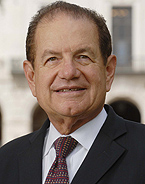“Oil in Troubled Waters” Public Forum to Examine the Cause, Consequences and Cost of Spill in the Gulf
May 13, 2010

The worsening deepwater oil spill off the Gulf of Mexico coast is the topic of a public briefing and discussion by several university experts in petroleum engineering, geology, law, business and environment Tuesday, May 18, sponsored by the Energy Institute at The University of Texas at Austin.
The 10 a.m. (CDT) program in the auditorium of the West Pickle Research Building near Loop 1 (MoPac) and West Braker Lane in Austin, is free and open to the public. It will address issues about the Deepwater Horizon disaster, including the cause, consequences and cost of the oil spill.
The briefing, titled “Oil in Troubled Waters” will feature leading university experts in areas of petroleum engineering, environment, public policy, law and geosciences. It will be moderated by Robert Hutchings, dean of the Lyndon B. Johnson School of Public Affairs at The University of Texas at Austin.
Speakers will include David Adelman, the Harry M. Reasoner Chair in Law at the School of Law; Dr. Tadeusz W Patzek, chairman of the Department of Petroleum and Geosystems Engineering, the Cockrell Family Chair in Engineering No. 11 and the Lois K. and Richard D. Folger Leadership Chair in Petroleum and Geosystems Engineering; Dr. Paul Bommer, founder of the oil and gas drilling and production operation Bommer Engineering Co. and senior lecturer in petroleum engineering; Dr. Charles G. Groat, director of the Center for International Energy and Environmental Programs; Dr. Sheridan Titman, the Walter W. McAllister Centennial Chair in Financial Services, Red McCombs School of Business, and Dr. Raymond L. Orbach, director of the Energy Institute.
The panelists will discuss what is now known about the cause of the accident, the unique problems in controlling and plugging a well in waters 5,000 feet deep, and what needs to be done to minimize the likelihood of an accident at these depths occurring in the future. Some of the panelists have had experience in consulting and other working relationships with energy companies and/or environmental organizations.
Panelists will describe the environmental damage that is occurring, the potential long-term effects on ecosystems and fish populations as well as the options for mitigating damage. Legal and financial issues will be addressed, such as who is liable for the damage, liability limits and the impact of the accident on BP and other companies involved with the drilling activities at the time of the accident.
The briefing and discussion will be webcast live via a link on the Energy Institute’s Web site. For more information, contact Charles Cooke, Energy Institute, 512-475-6397 or cooke@energy.utexas.edu.
# # #
For more information about research at the Jackson School, contact J.B. Bird at jbird@jsg.utexas.edu, 512-232-9623.
